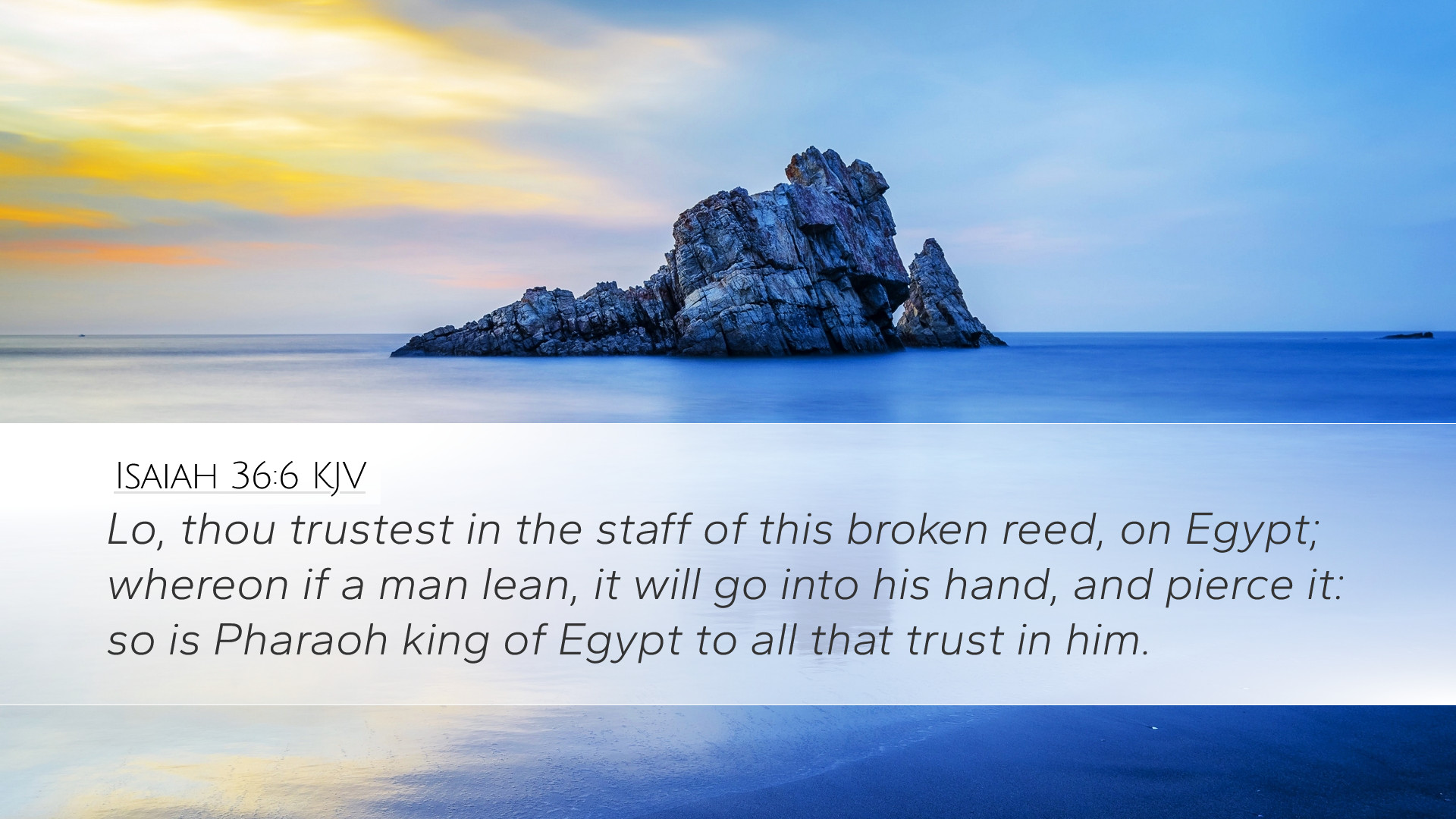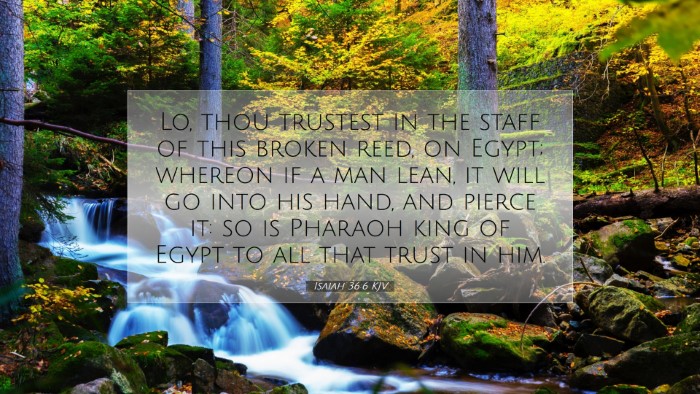Commentary on Isaiah 36:6
Verse: "Lo, thou trustest in the staff of this broken reed, on Egypt; whereon if a man lean, it will go into his hand, and pierce it: so is Pharaoh king of Egypt unto all that trust in him." - Isaiah 36:6
Introduction
This verse stands as a critical point in the narrative of Isaiah, where the Assyrian envoy Rabshakeh taunts Judah and questions the reliance on Egypt. It serves not only as a historical account but also carries profound theological implications about trust, vulnerability, and the nature of alliances in the face of crisis.
Contextual Analysis
Isaiah 36 fits into a broader historical context in which the Assyrian empire poses a significant threat to Israel and its neighbors. The attempt to rely on Egypt, which was traditionally viewed as a place of refuge, is here depicted as foolishness. The "broken reed" imagery serves to illustrate the fragility of human alliances.
The Historical Setting
At the time, Egypt was seen as a powerful nation but had become weak and ineffective compared to its storied past. In the face of aggression from Assyria, Judah’s leaders were tempted to seek assistance from Egypt rather than seek divine counsel. This moment implicitly reflects the turning away from reliance on God to reliance on human institutions.
The Assyrian Threat
The Assyrians had a reputation for their cruelty and military prowess. Rabshakeh’s speech is designed to instill fear and undermine the faith of the people of Judah. He highlights the ineffectiveness of their allies, encouraging them to abandon their trust in Egypt.
Theological Insights
This verse and the surrounding narrative evoke several theological themes that resonate throughout the biblical text.
Trust in God vs. Trust in Man
One of the clearest contrasts presented in Isaiah 36:6 is the juxtaposition of trust in God against trust in human alliances. The metaphor of a "broken reed" poignantly emphasizes that reliance on the nations—symbolized by Egypt—would lead to disappointment and injury.
- Matthew Henry: Henry notes that the "reed" signifies the weakness of human security. The image invites believers to reflect upon their dependencies and to evaluate justice and military strength as inadequate foundations for hope.
- Albert Barnes: Barnes comments that the metaphor relates to the fragility of political alliances. He interprets the 'broken reed' to mean the inevitable failure of Egyptian support against Assyrian might.
- Adam Clarke: Clarke expands on the imagery by interpreting it in practical terms, seeing it as a warning against superficial alliances that yield no substantial benefit or safety.
The Nature of Alliances
The reliance on Egypt also represents humanity's tendency to seek refuge in what seems strong or prominent. Yet, Isaiah critiques this tendency, reminding believers about the ultimate sovereignty of God over nations.
- Matthew Henry: He emphasizes that human alliances are transient and ultimately futile in the face of divine judgment.
- Albert Barnes: Barnes highlights that their expectations of Egypt's military might were misplaced, as God is the true defender of His people.
- Adam Clarke: Clarke questions whether any exile ever found true safety outside of God's will, suggesting that reliance on human strength has always led to disillusionment.
Practical Applications
For contemporary believers, Isaiah 36:6 serves as a cautionary tale regarding trust and security.
- Rely on God: The call is to maintain faith in God’s providence. Just as Judah was tempted to rely on Egypt, modern believers often lean on societal structures, wealth, or human wisdom rather than divine guidance.
- Assessing Relationships: The 'broken reed' metaphor invites individuals and communities to assess their relationships and alliances, ensuring they are grounded in faith and biblical truth rather than mere convenience or societal approval.
- Understanding Vulnerability: The verse provides insight into the nature of spiritual vulnerability—that leaning on human institutions can result in harm or disillusionment.
Conclusion
Isaiah 36:6 offers rich layers of meaning through its historical context and profound theological implications. By recognizing the inadequacies of human alliances, believers are encouraged to reaffirm their trust in God. As echoed throughout Scripture, our ultimate hope and security are not found in the strength of political powers but in the enduring faithfulness of the Creator.


